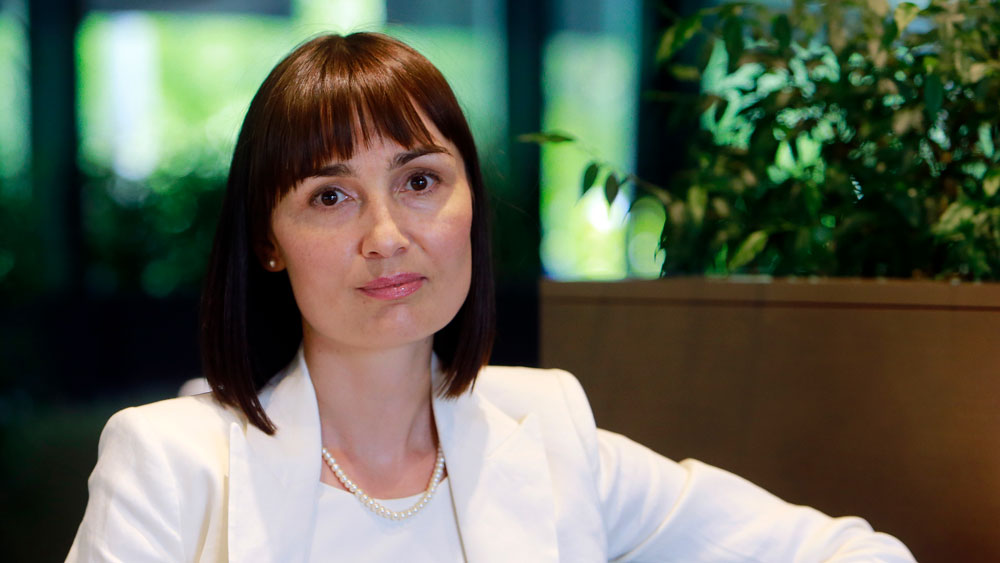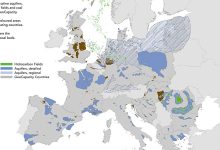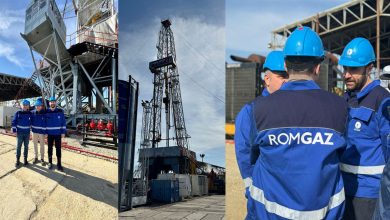Talking to Experts – Saniya Melnicenco
ROPEPCA’s Perspective on the Oil and Gas Market in Romania
The conversation with Saniya Melnicenco, Romanian Petroleum Exploration and Production Companies Association (ROPEPCA) President, had as main topic for debates the situation of the oil and gas market in Romania – challenges and outlook, ROPEPCA’s role and importance in the development of the oil and gas industry in Romania, as well as harmonization of stakeholders’ interests – benefits for the economy, investors, population.
“If I were to summarize in several words the current situation of the market, then the main subjects that I would include on the agenda are: safety of supply to consumers in Romania, modernization of the Petroleum Law and unpredictability of the fiscal and regulatory framework in the onshore segment. Regarding the energy security of the country, it is ensured at a rate of 90% by onshore companies, in terms of natural gas ranking first in Europe as regards onshore production exclusively. Currently, hydrocarbons account for over 68% of Romania’s primary energy sources, the share of natural gas in electricity generation being over 17%, and this figure is forecast also for the 2030 horizon, natural gas being an essential component of a balanced energy mix,” Saniya Melnicenco said.
International context
In the opinion of ROPEPCA President, in the international context characterized by the increase in demand and the commitment to reduce carbon emissions, Romania experiences a natural decline of production and lack of investments. Most productive fields are mature fields with production in decline. To continue operating these fields, large investments are needed. There is also a high geological potential still untapped, which could change the current situation. To understand the true potential, investments in exploration are required. Thus, the Association sees an opportunity in maintaining and even increasing gas supply in the country from domestic production – boosting investment through an adequate legislative framework, particularly in view of the recent public call for tenders published by the National Agency for Mineral Resources. Through the long-awaited Round XI for exploration, favourable prerequisites were created to attract the investments needed by Romania. Therefore, difficulties faced by titleholders of petroleum agreements should be solved by improving the current legislation.
From the practice of recent years, some of the most acute problems faced by producers in the exploration phase is that of land access, regulated under the Petroleum Law No. 238/2004. Not significantly amended since 2004, the law no longer matches the current realities of petroleum activities and no longer provides a functional legal mechanism.
ROPEPCA, in collaboration with state authorities and with other market players, has prepared a balanced proposal for the amendment of the Petroleum Law, in a manner that would bring it up to date. Currently, the amendment of the law is being debated and ROPEPCA actively participates in all the constructive debates in this regard, with all stakeholders.
The proposed draft starts from a basic principle, that petroleum operations are of national public interest. To better understand this aspect, Saniya Melnicenco also refers to European examples in the field: in Norway, the relevant legislation provides that management of state resources should be in the benefit of the Norwegian society as a whole; in Italy, hydrocarbon exploration is considered, under the law, of public interest; in the Netherlands, in terms of legislation in the field of spatial planning (Spatial Planning Act), subsoil exploitation is of national interest. Moreover, returning to Romania, according to the draft Energy Strategy, it is planned to boost long-term investments in the field of petroleum production, the document showing the importance of hydrocarbons in the whole energy picture for the following 30 years.
The draft amendment to the Petroleum Law also solves the issue of land access. “We are trying to harmonize the interests of landowners and those of land users, establishing in the end a fair mechanism for the payment of compensations for the potential damages caused to agricultural crops, in the case of exploration operations through geophysical data prospecting,” ROPEPCA representative pointed out.
As regards market situation, Saniya Melnicenco recalls that, starting with May 2019, under Government Emergency Ordinance No. 114/2018 (GEO 114/2018), the sales price at producers for natural gas intended to ensure household consumption and produce thermal energy was established at RON 68/MWh. This decision has disturbed the national market, in full process of maturation. Fully liberalized since April 2017, the gas market was never allowed to operate in a truly free manner. In 2018, other legislative provisions were introduced, with a major impact on the activity of gas producers and violating the principles of a liquid and functional gas market, as well as those of a healthy market economy. For example, under an amendment to the Electricity and Natural Gas Law No. 123/2012, upstream companies have the obligation to sell 50% of gas production on the centralized wholesale market. Failure to comply with this obligation may result in heavy penalties. Although there is no doubt about the justification or benefits of a centralized market, the Association believes that joining it must be voluntary. A main element of a free market is freedom to choose.
“Gas market functioning is seriously affected by the unpredictability of the fiscal regime applied to the industry, which is high compared to other European states. An example in this regard is the tax applied to windfall gains obtained by producers as a result of deregulation of the gas market, which was introduced as a temporary measure in 2013, aimed to ensure vulnerable consumers’ protection against potential fluctuations of prices generated by market liberalization. The tax became permanent by law in 2018 (Law No. 73/2018). In July, the Court of Auditors, through a performance audit report on the gas market in Romania, found that this tax has led to an increase in gas imports, which became cheaper,” ROPEPCA President pointed out.
According to a Deloitte study, commissioned by ROPEPCA in 2017 and updated in early 2018, the level of royalties and other similar taxes increased during 2014-2017 to 17.4%, way above the European average of 8.8%. In most European states, the average effective rate of royalties and taxes fell, in response to the strong decline of oil and gas prices that has affected the industry in the recent years. If we also took into account the decisions made in the last year, the rate would definitely be higher.
“Unpredictability on the taxation system in the gas sector is an important barrier for investors. By fiscal stability, Romania, which is a country with a long history of petroleum production, of more than 160 years, would have only benefits. The petroleum industry has provided a technological and economic growth of society and will continue to be a solid base for its welfare, being an accessible and safe source of heat, transport and electricity and having a significant impact on the development of other economic sectors, such as agriculture, medicine or research,” Saniya Melnicenco mentions.
ROPEPCA’s role and importance in view of development of the oil and gas industry in Romania
ROPEPCA has been the voice of the petroleum industry in Romania for seven years. The producers’ decision to have a unified voice has come amid a growing need to improve the industry’s framework, and ROPEPCA has become a dialogue partner with all stakeholders, from public authorities to industry and the media. Through the expertise of the Association, which brings together most titleholders of onshore petroleum agreements, it can provide valuable information about the market and industry on a number of subjects, whether it is about regulation, sustainable development, economy or technology.
ROPEPCA currently brings together 13 producers, which over the past five years invested over EUR 5 billion, the source of investments being diverse, bringing in Romania US, Australian, Kazakh, Canadian and European capital. According to a KPMG study conducted in 2016 on the economic impact of the industry, each EUR directly invested by producers reflects in national GDP, having a multiplication factor of 3.2. Besides investments directly related to the petroleum operations carried out, the members of the Association actively contribute to the improvement of quality of life in the communities where they carry out their activity, through projects with social, cultural or educational impact, whose annual average value is EUR 3.5 million. Social projects include rehabilitation of schools, kindergartens, hospitals, campaigns for the promotion of education by reducing school drop-out rates. Through these projects, companies want to meet the needs of local communities.
In the same period, ROPEPCA members maintained 14,000 specialized jobs and contributed to the state budget with over EUR 11 billion. This contribution to the state budget can be translated in the construction of 600 km of motorway or 40 county hospitals and 2,000 medium-sized schools.
Given the strategic importance of the onshore sector, the Association plans to increase the degree of awareness among citizens on the industry and its contribution for the economy and society. It also wants a constant and constructive dialogue with all decision-makers in the public and private sector, so as to make available its own expertise, in order to develop together projects that can bring benefits to society. Such projects are the one for the amendment of the Petroleum Law, in the sense of unlocking petroleum operations, or the impact study of GEO 114/2018, carried out by Deloitte at ROPEPCA’s request, showing the effects of the ordinance on the sector. The decision-makers have been informed on these projects, the Association committing to an apolitical dialogue, in order to improve the operating environment for oil and gas producers in Romania.
The workforce issue within the sector
The labour force in general is in continuous change and evolution, given the automation of processes in almost all sectors of activity. As regards the petroleum industry, the impact of changes in the labour market is even more significant.
Saniya Melnicenco refers to the study carried out in 2016 by McKinsey Global Institute. According to this study, over 14% of the representatives of the ‘millennials’ generation don’t want to work in the petroleum industry. This rate is the highest among all industries considered by the study, the main reason being the young people’s perception of the industry.
“Thus, we will have to change their views of the industry and prove that it can provide a modern, dynamic, socially responsible and environment-friendly career. Companies will have to provide professionals in the industry with the opportunity to stand out and actively contribute to the sustainable development of society, even behind the desk. Thus, in the context of the increasingly accentuated discussions on environmental protection, transition to an environmentally sustainable society must be capitalized, including in the labour market. Natural gas, the least polluting conventional energy resource, is the basis for sustainable developments from an energy point of view in the coming years, and considerable investment in energy-efficient technologies is needed to capitalize on it. Such investment, according to the mentioned study, has the potential to generate, at global level, up to 10 million new direct jobs in the industry and other up to 10 million jobs in the related sectors,” Saniya Melnicenco shows.
The industry, including that in Romania, has faced a period of reduction of the qualified staff, due to decrease in oil prices in 2014 (‘The Great Crew Change’). “Further, we will have to find the best measures to retain specialists in the industry in Romanian projects, and this goal cannot be achieved, unless investment is boosted through an adequate regulatory framework. Decision-makers could take advantage of the productivity benefits of this energy revolution, by integrating technological changes and allowing the free trade of the energy mix. Regarding producers, they should have the opportunity to participate in a fully liberalized gas market, allowed to mature, for prices to become balanced and to boost investment in order to increase production. Strategic storage of resources when prices are low can be a solution for importers, to protect against supply challenges or price increases,” Saniya Melnicenco points out.
There are solutions, but they all have to be implemented through a positive law-making, with a medium and long-term vision regarding the energy sector and all its components. For this purpose, ROPEPCA supports the need for constant dialogue between industry and lawmakers, aimed to address technological and social problems raised by transition to a sustainable development.
NAMR’s 11th Round
Saniya Melnicenco says the 11th licensing round for exploration blocks is a window of opportunity for the economic development of Romania, by attracting investments. Without the proper measures, Romania risks remaining uncompetitive and unattractive as compared to other countries in the region. Several aspects should be considered when investments are made in the petroleum industry, from both a national and global perspective. When it comes to political and regulatory stability, there is definitely a need for improvement in Romania, especially because over the past few years several decisions with adverse effects on the industry have been made. The success of this round depends to a great extent on taking measures to boost exploration and development of new fields: modernization of the Petroleum Law, clear regulation of land access, cutting red tape and optimization of permitting processes.
“Challenges faced by an investor in Romania in our industry are related to the three components of the exploration strategy: accessibility of geological data, application of technologies and allocation of capital. The regime of classified data puts projects in Romania in the disadvantaged situation of underfinancing and isolation from the globalized and digitally connected world. Also, bringing performing technologies is closely related to the existence of qualified and experienced staff in the field, involving a significant financial effort. The allocation of capital to certain projects pursues a favourable legislative and fiscal framework, as well as a reasonable return on investment, provided only through the mechanisms of a functioning market economy. Without these measures, Romania will remain uncompetitive in terms of investment attractiveness compared to other countries in the region, such as Hungary, Croatia or Poland, which despite the lower geological potential manage to successfully complete licensing rounds for exploration blocks. This spring, Ukraine managed to organize a licensing round for the award of onshore and offshore blocks that had a significant success and attracted powerful and responsible companies. As I said, the solution is represented by decisional transparency, legislative stability, efficiency of the regulator and awareness of importance of this industry as a strategic component of the national economy,” Saniya Melnicenco concludes.
Harmonization of stakeholders’ interests – benefits for economy, investors, population
ROPEPCA believes that the state-producer-consumer relationship can be represented by an equilateral triangle. The state must build public taxation policies so that it meets the need to protect consumers, the need of the public budget to achieve satisfying revenues for the state, as well as the needs of producers operating in Romania to be encouraged to continue operations in this market, to invest in new and performing technologies, to create jobs, to make revenues and profit and thus be able to continue ensuring energy supply to the country. The development of the petroleum exploration and production sector in Romania can be done only by collaboration between the public and the private environment, always considering consumers’ interests and sustainable development of society.
In the context of changing the perception at global level on the environmental factor, the petroleum industry is in continuous change and evolution. Thus, the Association is open to dialogue with the decision-makers to materialize public policies truly addressing consumers’ needs, for the responsible development of the industry by caring for employees and consumers.
ROPEPCA wants to improve general perception of the industry and generate dialogue not only with authorities, but with society as a whole to raise awareness of the importance of the energy sector for economic growth and benefits for society. The Association proposes a transparent and constructive approach in dialogue with public and private stakeholders, in which it can use its own expertise to develop projects that can benefit society in general and build on the conclusions of impact studies in a timely manner. Through active participation, ROPEPCA aims to get involved in drafting laws that create the best medium-term and long-term framework for the industry to work and open up opportunities for new investment.







